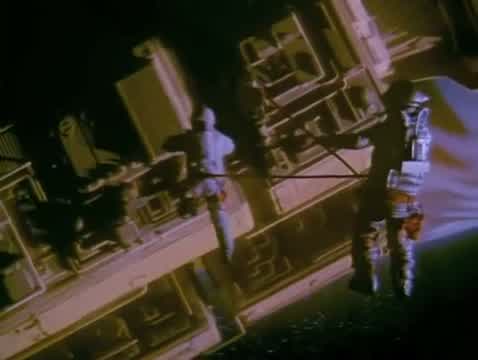Director:
Peter HyamsGuión:
Peter HyamsCámara:
Peter HyamsMúsica:
David ShireReparto:
Roy Scheider, John Lithgow, Helen Mirren, Bob Balaban, Keir Dullea, Madolyn Smith-Osborne, Dana Elcar, James McEachin, Mary Jo Deschanel, Elya Baskin (más)Streaming (2)
Sinopsis(1)
Mientras el planeta Tierra se cierne en una auto-destrucción nuclear, los conflictos internacionales se ven superados a nivel estelar por un equipo de científicos rusos y americanos que se lanzan al encuentro de la nave espacial Discovery y su único superviviente, la computadora HAL. Su misión: "despertar" a HAL y descubrir el enigma de una serie de acontecimientos que culminaron con la última transmisión del astronauta Bowman: "¡Dios mío, hay miles de estrellas!" (Warner Home Video)
(más)Reseñas (5)
The otherwise average director Peter Hyams has pleasantly surprised me. 2010 is a film with very good visual effects, an interesting story and a well executed final twist. But it should not be compared with Kubrick’s 2001, that one is a league of its own.
()
Kubrick’s 2001 is a work of art that played with the medium in an unprecedented way, Hyam’s 2010 is nothing more than well executed science fiction, which I don’t mind at all. It was thrilling, it was entertaining, the effects are again perfect for its time, I’ve no reason to complain. Thanks to the clearer shifts in the plot, I’m planning to read the literary sequel because I’m curious about how it continues. If a film manages that, it’s a hit :)
()
I would say that this movie shows which director is a genius and which is a routiner. While Stanley Kubrick has made a groundbreaking and legendary sci-fi in the late 1960s, almost 20 years later a routiner Peter Hyams made a solid but (compared to Kubrick) a very routine movie. However, although it is routine it is still a sci-fi classic.
()
A very successful adaptation of Clarke’s book. At the same time, it’s very hard to compare both movies (2001 and 2010) because they are both filmed in a completely different way (some people would certainly like to stone me to death for giving them the same amount of stars). While in the first one, the secretive Kubrick was more interested in presenting mysticism, the down-to-earth Hyams put his money on action, and that was a good choice (you simply can’t compete with a giant such as Kubrick, so you have to take a different path). Such a lot happens in the movie and it is pretty impressive visually. But the screenplay, where the story is set in the Cold War, in today’s world just isn’t so powerful. Clarke was much more forward-thinking. Oh, and one more thing, Roy Scheider is certainly a better Floyd that William Sylvester. Kuritsa.
()
Maybe I’m being too nice, but I liked this movie. It is, of course, completely different than the first part and any comparison is out of the question. Kubrick's trip into the future was a unique cinematic treat, an amazing play of effects with the director's infinite imagination where the actors were completely incidental. But there is only one Kubrick; Peter Hyams knew that very well and managed to create science fiction of quite a different kind that draws on Clark's excellent script, with a few moments that even continued the mystical atmosphere of the famous first film. The stunts and effects were again excellent, the actors were likeable (though I missed the Russian from Armageddon), and the final twist, which I was eagerly awaiting the whole time, was not badly thought out and didn't spoil the overall impression. I certainly don’t recommend putting on the second Space Odyssey without watching Kubrick’s film first, it’d be a great shame to write off this space adventure in advance.
()

